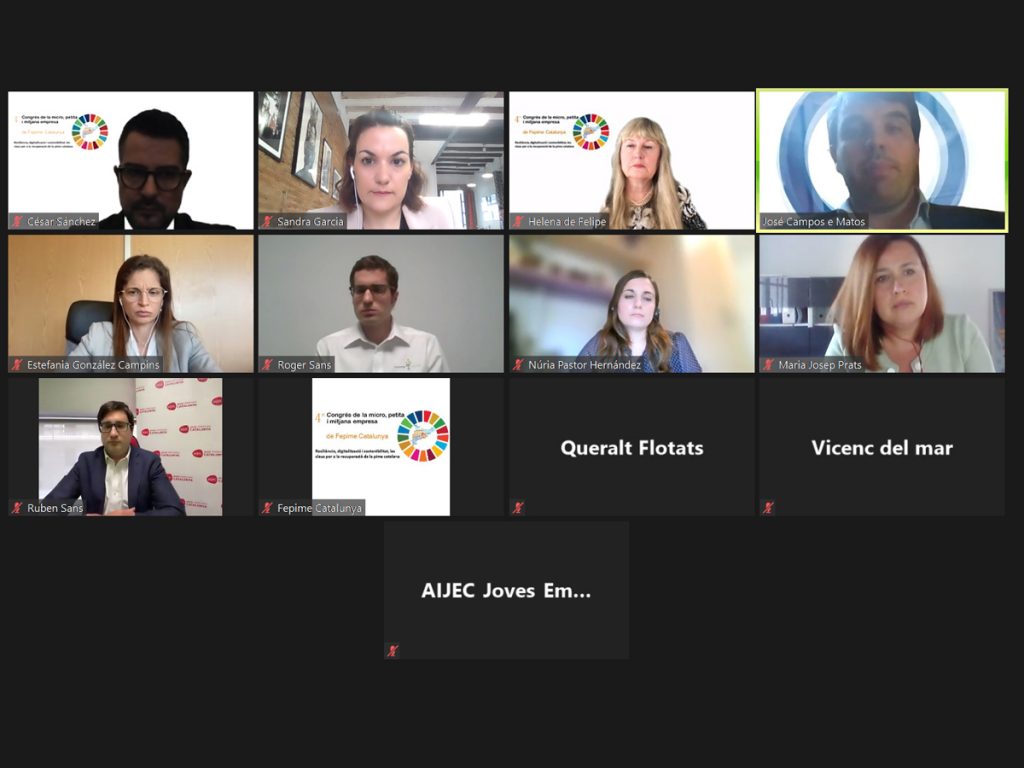
AIJEC Joves Empresaris has participated this Wednesday in a new session of the IV Congress of SMEs of Catalonia organized by Fepime Catalunya. The purpose of the session was to analyze the current state of Catalan SMEs promoted by young entrepreneurs and to prepare a memorandum of proposals for improvement that will be delivered to the administrations.
The president of the AIJEC, Ruben Sans, explained that the crisis has found young people more prepared for change and more digitized and that the pandemic is an opportunity for all SMEs to modernize, become more efficient and understand that the The survival of the company is not only in the income statement, but in intangibles such as the team, technology, innovation or training. “Entrepreneurship must be supported from all areas, since entrepreneurship is one more business option. We need to promote digitization as a transforming axis of the productive fabric, we need more aid to reach companies and for the administration to avoid unnecessary procedures, and to create an environment that favors the creation of companies and where legal security and stability prevail”, he assured. .
The session featured the intervention of José Campos e Matos, president of YES FOR EUROPE, the European Confederation of Young Entrepreneurs, who stated that young people have the ability to detect new market opportunities and take advantage of them, but They need investment and financing. “A review of the tax administration is necessary and support companies with tax refunds. The best way to increase tax revenue is to support strong growth, with strong and sustained stimulus, to companies.”
Maria Josep Prats, Co-founder of 1001 Cover Correduría de Seguros and president of AIJEC Plus, has lamented the unpositive stereotypes surrounding the figure of the businessman. “The lack of specific referents contributes to continue with these stereotypes. We must expand the idea that being an entrepreneur implies acting with values and creating references to change the vision that people have of us. To work on improving the image of the entrepreneur, training, new ways of understanding and exercising leadership and being able to show references in this line are key. There is another way to lead with fairness, empathy, justice and communication”.
Along these lines, Núria Pastor, CEO and founding partner of humanITcare, and winner of the 2020 Best Business Initiative Award, added that “it is important that companies generate not only work but a purpose and values so that workers have a feeling of belonging to the community and want to work in the company”.
Regarding the role of women entrepreneurs, Sandra Garcia, director of LIPPA Communication, explained that in the last seven years, the percentage of women who start the path to have their own company has almost doubled in Catalonia and that there is a Increased visibility of success stories led by women in the media. “We young entrepreneurs are clear that we must continue promoting entrepreneurial policies by putting people at the center and with mechanisms that allow us to incorporate all realities and all diversities because we cannot afford to build with only half the population. “.
Roger Sans, CCO of Ecomotive Solutions, focused his speech on sustainable mobility and argued that the change in the energy model will present challenges and opportunities for most companies and that agility and a vision focused on the resources of the future will be key. “The change strategy based on the pillars of energy efficiency, environmental impact, sustainable economy and fair transition must be based on collaboration between the different actors in the mobility ecosystem”.
In the field of the automotive sector, Jordi Priu, CEO of MMM, has shown his concern about the growing problems of supply of raw materials. “Prices are showing an upward trend, delivery times are getting longer and this causes an extra cost in a very competitive sector that is undergoing transformation.”
Finally, Estefania González Campins, member of EQTIC and vice president of AIJEC, has claimed the role of young people to lead the digital transformation and the current scenario of change. “Attracting talent is a problem and not only because of money: you have to have an interesting, stimulating project, a company with a purpose that seduces talent and retains it. A strategy focused on investing in innovation, generating new models, new channels, investing in people, in training, in generating talent and creating benchmarks among young people who see that entrepreneurship is a real opportunity with new models of understanding and exercising the lead.
The IV Congress of the micro, small and medium enterprises of Catalonia 2021 will end on June 15 at the headquarters of Foment del Treball accompanied by the main economic actors of Catalonia. The congress consists of around 20 meetings with 24 regional and sectoral organizations from Catalonia.
The president of Fepyme, María Helena de Felipe, aims to establish a dialogue to address the concerns of SMEs in this exceptional context, as well as discuss possible actions that can facilitate a resilient, digital and sustainable business recovery. In fact, the motto of the meetings is “Resilience, digitization and sustainability, the keys to the recovery of Catalan SMEs” and the purpose is to learn first-hand the reality and needs of Catalan SMEs after a 2020 marked by the passage of the pandemic.
Undoubtedly, Covid-19 has not only saturated the Catalan health system, but has also conditioned business activity, resulting in an economic crisis that continues to drag on over time due to the restrictive measures that governments have been applying with the objective of preventing the spread of the disease.
The meetings with the different organizations are scheduled as work sessions to collect the main difficulties and challenges of SMEs in different areas such as infrastructure, financing, taxation, innovation, internationalization, labor relations, energy consumption, administrative procedures, training or unfair competition, always from the perspective of the SME.
The conclusions of the sessions will allow a document to be drafted that includes the main concerns of each sector and territory to improve business activity.